Growing Future Teachers
University, Newark and AFT team up on Red Hawks Rising Teacher Academy to diversify teacher pipeline
Posted in: Education, Homepage News, University
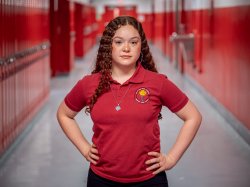
Melissa De Almeida loves Newark’s Ironbound district, a four-square mile, largely working-class and restaurant destination near downtown where Spanish and Portuguese are spoken daily. She lives there, attends high school in the heart of it and appreciates the diversity of its residents. When she graduates from Montclair State University, which she’ll attend full time next fall as part of a program to diversify the ranks of teachers in Newark, she’ll be able to return to teach in the neighborhood she loves.
“It’s nice to be in an environment where there’s so many different cultures. You learn things from other cultures that you didn’t know,” says De Almeida, the 17-year-old daughter of Brazilian immigrants, who says she counts people of various ethnicities among her friends. “I would like to come back and teach at my old middle school. Oliver Street School is a very important place to me. My cousins and older sister went there. I have history there. So going back would be like giving back to the teachers that taught me so much. Going back has always been in my plans.”
The Red Hawks Rising Teacher Academy – a partnership between Montclair State University’s College of Education and Human Services, Newark Board of Education and the American Federation of Teachers (AFT), was designed for students like De Almeida, a senior at East Side High School.
The partnership was announced in February 2019 and the Red Hawks Rising program launched in September of that year when two Teacher Academies were created at East Side and University high schools to help build a locally grown, diverse teacher workforce.
On Monday, February 14, AFT President Randi Weingarten was joined by Montclair State University President Jonathan Koppell and Newark Board of Education Superintendent Roger León at East Side High, where she announced that AFT will award each of the 21 students in the Red Hawks Rising Teacher Academy stipends of $3,700 to help offset education costs.
“We want to make sure that you can dream your dreams and achieve them,” Weingarten told the students, adding that the stipends are meant to make the goal of returning to teach in Newark “doable and workable for you.”
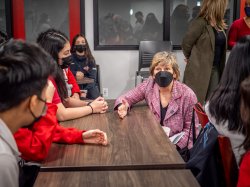
Koppell shared with students that Montclair started as a normal school to prepare teachers.
“There’s truly nothing more important. We’re excited to be working with the AFT on this project and excited that we have a long history with East Side of training and preparing teachers who come back.”
Speaking to the students directly, he said: “I’m excited on your behalf, that you will get to see how much influence you truly can have on other human beings’ lives. So thank you for your commitment to a lifetime of service. Congratulations on embarking on a path that I think you’re going to find to be enormously gratifying.”
Superintendent León promised all of the Teacher Academy students contracts to teach in Newark upon completion of their degrees and teacher certifications. “We need great teachers to return here,” he said. “In 2027, I hope to see all of you back here.”
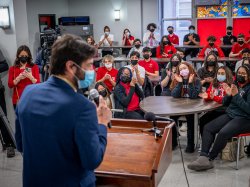
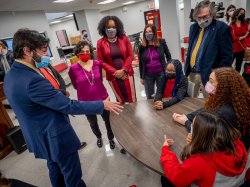
Nationally and statewide, those in education are focused on the demographic disparities between student populations and the teachers entrusted with their learning. Despite New Jersey being among the most diverse states in the country, its teachers are largely white and female, according to state reports. Only 16% of New Jersey’s almost 130,000 teachers are people of color, while 56%, or 1.4 million, students are. Research has shown it is beneficial for students to have teachers who are of the same race or ethnic group and have similar cultural experiences.
“This significant cultural and linguistic mismatch has led to high suspension, expulsion and dropout rates as well as evidence of low academic expectations. Research shows that if a Black student has at least one Black teacher during their academic career, they are more likely to pursue post-secondary education,” says AFT Associate Director for Educational Issues Dyan Smiley, who works with Montclair State and Newark program officials. “We would eradicate the school to prison pipeline. Black and brown teachers are more apt to provide counseling and seek resources for students of color before calling law enforcement. To be clear, the goal is not to remove all white teachers, but to provide ongoing professional development and support to all teachers, so they become and further develop as culturally sustaining practitioners.”
That’s where the Red Hawks Rising Teacher Academy comes in. While discussions about the Academy were taking place, Jennifer Robinson, executive director of the Center of Pedagogy, had received a grant from the State of New Jersey to diversify the teacher education pipeline.
“So, all of these things came together in a really serendipitous moment and Red Hawks Rising became an integral part of that pipeline,” says Mayida Zaal, associate professor in the Department of Teaching and Learning, who co-leads the program with Danielle Epps, director of Teacher Education Admissions, Recruitment and Diversity at the Center of Pedagogy.
“It’s a ‘grow your own’ program that is focused around the dynamic of a community trying to develop a future pipeline of teachers for their district,” says Epps. “This program helps to expose them to the education field, with emphasis on teacher education.”
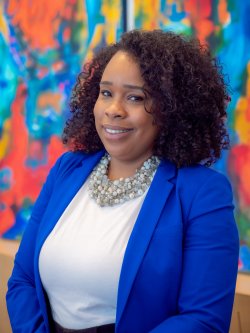
Superintendent León, a Newark Public Schools and Montclair State alumnus (’96 MA) chose the two high schools as designated Teacher Academies. Currently, there are 35 student participants in the dual-enrollment classes: 21 at East Side High School and 14 at University High School.
Zaal helped Newark develop the Teacher Academy curriculum. She notes that if students meet all of the requirements of the dual enrollment program, they can graduate high school with up to 30 credits and if they maintain a 3.0 GPA, they are guaranteed admission into Montclair State University.
The Teacher Academies have three cohorts of students – Teacher I, II and III – and are built around social justice and community activities, according to East Side High Vice Principal Michael West. East Side or University High School students can choose to explore a teaching pathway as early as ninth grade. As juniors and seniors, they can take college-level courses that will apply toward a degree at Montclair. Those courses are taught by University faculty at each of the two high schools. To help students along the way, two success coaches from Montclair’s Center for Academic Success and Tutoring “provide academic, emotional, any type of support that the student may need throughout the course,” West says.

Zaal adds that in addition to academic support, the coaches help students with the more practical side of college life: “They unpack what students need, like how do you read a college syllabus? How do you upload an assignment? How do you ask your professor for feedback? All of those kinds of skills that they need in order to make them successful in college and make them feel confident that ‘Yes, there are resources out there and I know where to find them.’”
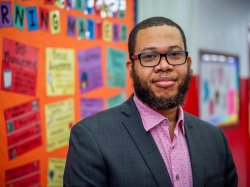
The dual enrollment courses are college basics, such as introduction to sociology, that will transfer to Montclair and count toward any major as general electives. Not all students may want to go into teaching but Epps says the program is designed to expose them to the wide range of careers needed in the field of education, noting that a student who may want to study nursing could become a school nurse, for example.
“Ideally, if they complete all the courses by their senior year, they will earn up to 30 college credits from Montclair State University,” West says. Once students have 30 college credits, they can participate in SubIN, seek substitute teacher certification and work part time as subs regardless of their major.
AFT’s Smiley has high praise for the work being done in Newark.
“The commitment to the program, students and each other is unlike anything I have witnessed,” she says.“Each week members from each of the partner groups assemble on Zoom to plan programmatic outcomes and learning experiences for the students. We problem-solve together and hold high expectations for our work. This team is the magic sauce!”
West agrees: “The cooperation and the partnership have been just excellent. I can’t say enough about our partners AFT, as well as Montclair State and University High School. It really has been a collaborative effort from all of us to get to where we are right now.”
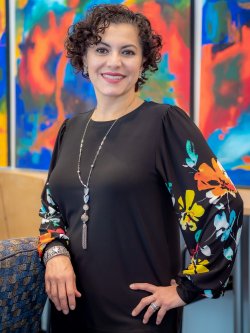
Epps adds that growing your own students into teachers is about locals who get the nuances and subcultures of communities, so “that educators can build relationships and rapport with students.”
Zaal, who has been doing work in Newark on behalf of Montclair for years, says, “Having this opportunity to support young teachers into the profession and then bringing back their knowledge is such a powerful testament to the kind of justice work that I’m committed to.”
As a first-generation Arab Latina, who did not always know where she belonged, Zaal says, “Creating space for students from non-dominant groups in the teaching profession means they can be a part of transforming education in their own communities.”
Smiley commends the students participating in the program.
“I am impressed with student engagement and commitment to the academy,” she says. “While all may not go on to become teachers, they are learning valuable lessons that will carry with them through post-secondary and beyond. They are unpacking their own understanding of what it means to ‘learn’ and gain knowledge for different purposes. They are also learning that they have talents and gifts to share. That message is not often relayed to students from marginalized communities. I am so proud of the students for trusting us to shepherd them through this new experience.”
The dual-enrollment program also saves students and their parents money; students do not have to pay for the dual-enrollment courses or textbooks and get a jump-start on their college careers. This is a potential savings of up to a full year of college tuition and fees, which is significant, given the student debt crisis, says Zaal. Costs are covered by the Newark Board of Education.
That’s helpful to De Almeida’s family as she goes from a Rising Red Hawk to a full-time undergraduate student next fall; she’s been accepted to Montclair, where she will major in Teacher Education.
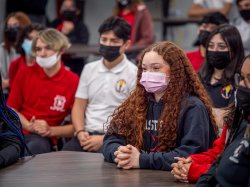
De Almeida says it was her teachers, many Montclair alumni, who inspired her to want to attend her “dream school.”
“I had such great teachers when I was younger, and they influenced me so much. I strive to be like them and be able to do that for other kids,” she says. “I’ve been looking into it [Montclair] for a while now, and not just because of the education program, but I know so many people that went there: my coaches, my teachers. It’s a great school.”
Earning college credits while still in high school means it will save her parents money. “My parents are grateful that I can start early on my college courses.”
One of the first two students (the other is Rosalie Rodriguez from University High School) to get accepted into Montclair from the Teacher Academy, De Almeida is an ambassador for the program, telling other students and their parents during an information session about the Red Hawks Rising Teacher Academy last semester: “As someone who wants to become a teacher and loves kids, this program is such a great opportunity. I’ve always dreamed of coming back to teach in Newark because to me, Newark is home.”
Story by Staff Writer Sylvia A. Martinez, Photos by University Photographer Mike Peters
You may also like:
